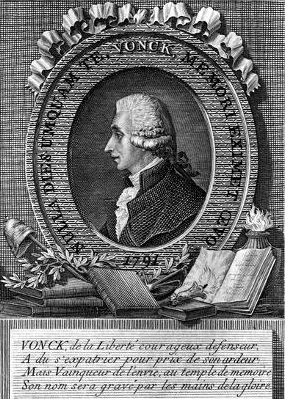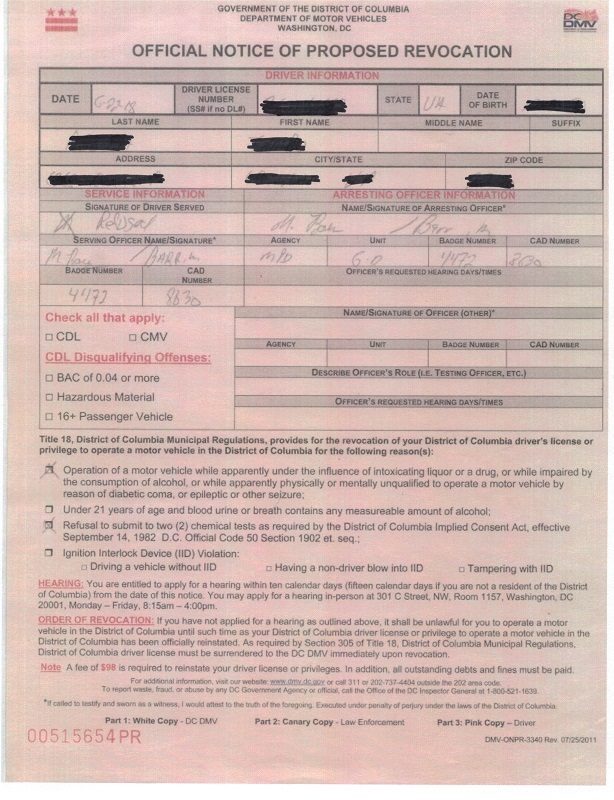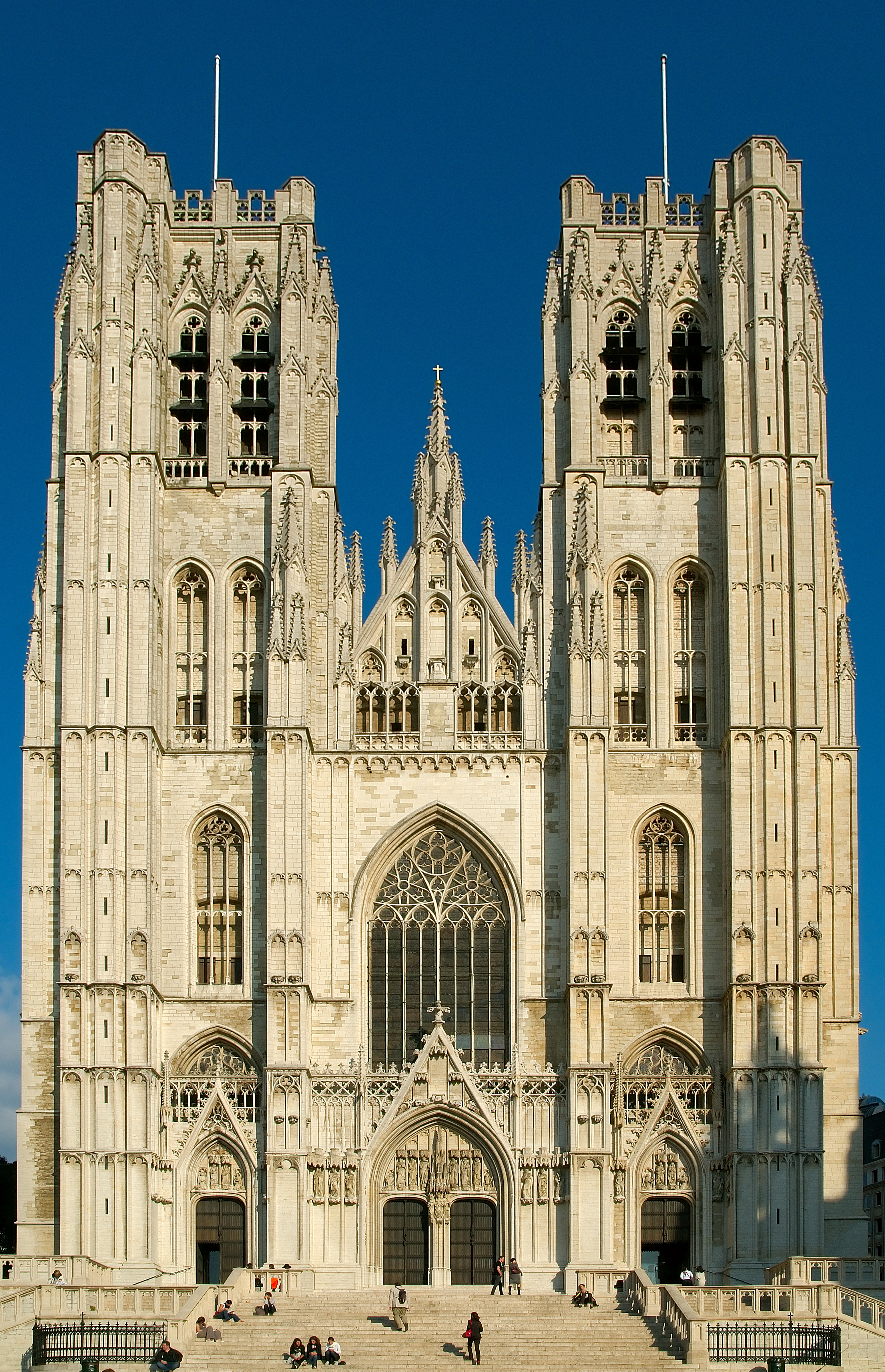|
Statists (Belgium)
The Statists ( nl, Statisten) were a conservative political faction in the United Belgian States during the Brabant Revolution (1789–1790). They were led by Henri Van der Noot and fiercely opposed to the more radical "Vonckist" faction, led by Jan Frans Vonck. History The Statists initially tried to bring about a revocation of the reforms of the Habsburg monarchy, Habsburg Joseph II, Holy Roman Emperor, Emperor Joseph II which they perceived as an attack on regional freedom. In 1787 they organized a wave of uprisings and rioting known as the Small Revolution and the resulting crackdown by the Austrian forces forced Van der Noot and his Statists into exile in the Dutch Republic. Statists supported Belgian independence but their main area of concern was protecting the local privileges and the Catholic Church. After the proclamation of the United States of Belgium, the Statist managed to exclude the Vonckists from government and forced them into exile. The new Belgian state was sho ... [...More Info...] [...Related Items...] OR: [Wikipedia] [Google] [Baidu] |
Henri Van Der Noot 1790
Henri is an Estonian, Finnish, French, German and Luxembourgish form of the masculine given name Henry (given name), Henry. People with this given name ; French noblemen :'' See the 'List_of_rulers_named_Henry#France, List of rulers named Henry' for Kings of France named Henri.'' * Henri I de Montmorency (1534–1614), Marshal and Constable of France * Henri I, Duke of Nemours (1572–1632), the son of Jacques of Savoy and Anna d'Este * Henri II, Duke of Nemours (1625–1659), the seventh Duc de Nemours * Henri, Count of Harcourt (1601–1666), French nobleman * Henri, Dauphin of Viennois (1296–1349), bishop of Metz * Henri de Gondi (other) * Henri de La Tour d'Auvergne, Duke of Bouillon (1555–1623), member of the powerful House of La Tour d'Auvergne * Henri Emmanuel Boileau, baron de Castelnau (1857–1923), French mountain climber * Henri, Grand Duke of Luxembourg (born 1955), the head of state of Luxembourg * Henri de Massue, Earl of Galway, French Huguenot soldie ... [...More Info...] [...Related Items...] OR: [Wikipedia] [Google] [Baidu] |
United Belgian States
The United Belgian States ( nl, Verenigde Nederlandse Staten or '; french: États-Belgiques-Unis; lat, Foederatum Belgium), also known as the United States of Belgium, was a short-lived confederal republic in the Southern Netherlands (modern-day Belgium) which was established after the Brabant Revolution. It existed from January to December 1790 as part of the unsuccessful revolt against the Habsburg Emperor, Joseph II. Background Influenced by the Enlightenment, Emperor Joseph II, who became sole ruler of the Habsburg lands after Maria Theresa's death in 1780, decreed a series of large-scale reforms in the Austrian Netherlands designed to radically modernize and centralize the political, judicial and administrative systems. Characteristically, the well-intentioned but autocratic Emperor abruptly imposed his reforms without even a semblance of consultation with the population, which actually included an influential urban intelligentsia and other segments of the ruling classes ... [...More Info...] [...Related Items...] OR: [Wikipedia] [Google] [Baidu] |
Brabant Revolution
The Brabant Revolution or Brabantine Revolution (french: Révolution brabançonne, nl, Brabantse Omwenteling), sometimes referred to as the Belgian Revolution of 1789–1790 in older writing, was an armed insurrection that occurred in the Austrian Netherlands (modern-day Belgium) between October 1789 and December 1790. The revolution, which occurred at the same time as revolutions in France and Liège, led to the brief overthrow of Habsburg rule and the proclamation of a short-lived polity, the United Belgian States. The revolution was the product of opposition which emerged to the liberal reforms of Emperor Joseph II in the 1780s. These were perceived as an attack on the Catholic Church and the traditional institutions in the Austrian Netherlands. Resistance, focused in the autonomous and wealthy Estates of Brabant and Flanders, grew. In the aftermath of rioting and disruption in 1787, known as the Small Revolution, many dissidents took refuge in the neighboring Dutch Republ ... [...More Info...] [...Related Items...] OR: [Wikipedia] [Google] [Baidu] |
Henri Van Der Noot
Henri van der Noot, in Dutch Henrik van der Noot, and popularly called Heintje van der Noot or Vader Heintje (7 January 1731 – 12 January 1827), was a jurist, lawyer and politician from Brabant. He was one of the main figures of the Brabant Revolution (1789–1790) against the Imperial rule of Joseph II. This revolution led to the short-lived existence of the United States of Belgium with himself as Prime MinisterDocuments Illustrating the History of Belgium. Ministry of Foreign Affairs, External Trade and Cooperation in Development. Brussels. 1978Volume 2: From Prehistoric Times to 1830 (Memo from Belgium, Views and Surveys series, number 180). Page 198. (11 January 1790 – 2 December 1790). Family He was the son of Nicolas van der Noot, Lord of Vrechem, and is distantly related to the current Marquess of Assche. Overview Two lawyers, Jan Frans Vonck and Henri Van der Noot, were the leaders of the revolt but each represented a different faction. The Vonckists were inspir ... [...More Info...] [...Related Items...] OR: [Wikipedia] [Google] [Baidu] |
Vonckist
The Vonckists ( nl, Vonckisten) were a political faction during the Brabant Revolution led by Jan Frans Vonck, opposed to the more conservative " Statists". History The group emerged from the secret society ''Pro aris et focis'' in the 1780s, and by 1789 had become a distinct faction. The Vonckists called for a popular government along the model seen during the French Revolution. After the proclamation of the United Belgian States The United Belgian States ( nl, Verenigde Nederlandse Staten or '; french: États-Belgiques-Unis; lat, Foederatum Belgium), also known as the United States of Belgium, was a short-lived confederal republic in the Southern Netherlands (modern-da ... in January 1790, the Vonckists were denounced as anticlerical by the Statists and many were hunted down by mobs in what was known as the "Summer Terror". Jan Frans Vonck was forced into exile in France. References {{reflist United Belgian States Liberalism in Belgium Republicanism in Belgium ... [...More Info...] [...Related Items...] OR: [Wikipedia] [Google] [Baidu] |
Jan Frans Vonck
Johannes Franciscus Vonck, also known by the Francization Jean-François Vonck or the Netherlandization Jan-Frans Vonck, (29 November 1743 – 1 December 1792) was a lawyer and one of the leaders of the Brabant Revolution from 1789–1790. This Revolution led to the founding of the United States of Belgium in January 1790. Vonck was the leader of the radical Vonckists faction of revolutionaries which were named after him. They were inspired by the French Revolution, pleaded for the abolition of the feudal government of the state based on privileges and were in favour of a more centralised government. Childhood Jan Frans Vonck was born in Baardegem, the son of a well-to-do farming couple, Jan Vonck and Elisabeth van Nuffel. He had a brother who later became priest, Benedictus Hieronymus, and three sisters: Maria Anna Josepha, Anna Margaretha and Maria Theresia. Vonck studied humanities at the Jesuit college in Brussels. Afterwards, he attended the gymnasium in Geel. From 24 Januar ... [...More Info...] [...Related Items...] OR: [Wikipedia] [Google] [Baidu] |
Revocation
Revocation is the act of recall or annulment. It is the cancelling of an act, the recalling of a grant or privilege, or the making void of some deed previously existing. A temporary revocation of a grant or privilege is called a suspension. Contract law In the law of contracts, revocation is a type of remedy for buyers when the buyer accepts a nonconforming good from the seller. Upon receiving the nonconforming good, the buyer may choose to accept it despite the nonconformity, reject it (although this may not be allowed under the perfect tender rule and whether the Seller still has time to cure), or revoke their acceptance. Under Article 2 of the Uniform Commercial Code, for a buyer to revoke, he must show (1) the goods failed to conform to the contract ''and'' (2) it substantially impaired the value of the goods (this is a question of fact). A Proposal/Offer May be revoked at any time, before the communication of its acceptance is complete as against the proposer, but not afte ... [...More Info...] [...Related Items...] OR: [Wikipedia] [Google] [Baidu] |
Habsburg Monarchy
The Habsburg monarchy (german: Habsburgermonarchie, ), also known as the Danubian monarchy (german: Donaumonarchie, ), or Habsburg Empire (german: Habsburgerreich, ), was the collection of empires, kingdoms, duchies, counties and other polities that were ruled by the House of Habsburg, especially the dynasty's Austrian branch. The history of the Habsburg monarchy can be traced back to the election of Rudolf I as King of Germany in 1273 and his acquisition of the Duchy of Austria for the Habsburg in 1282. In 1482, Maximilian I acquired the Netherlands through marriage. Both realms passed to his grandson and successor, Charles V, who also inherited the Spanish throne and its colonial possessions, and thus came to rule the Habsburg empire at its greatest territorial extent. The abdication of Charles V in 1556 led to a division within the dynasty between his son Philip II of Spain and his brother Ferdinand I, who had served as his lieutenant and the elected king of Hungary and ... [...More Info...] [...Related Items...] OR: [Wikipedia] [Google] [Baidu] |
Joseph II, Holy Roman Emperor
Joseph II (German: Josef Benedikt Anton Michael Adam; English: ''Joseph Benedict Anthony Michael Adam''; 13 March 1741 – 20 February 1790) was Holy Roman Emperor from August 1765 and sole ruler of the Habsburg lands from November 29, 1780 until his death. He was the eldest son of Empress Maria Theresa and her husband, Emperor Francis I, and the brother of Marie Antoinette, Maria Carolina of Austria and Maria Amalia, Duchess of Parma. He was thus the first ruler in the Austrian dominions of the union of the Houses of Habsburg and Lorraine, styled Habsburg-Lorraine. Joseph was a proponent of enlightened absolutism; however, his commitment to secularizing, liberalizing and modernizing reforms resulted in significant opposition, which resulted in failure to fully implement his programs. Meanwhile, despite making some territorial gains, his reckless foreign policy badly isolated Austria. He has been ranked with Catherine the Great of Russia and Frederick the Great of Prussia ... [...More Info...] [...Related Items...] OR: [Wikipedia] [Google] [Baidu] |
Dutch Republic
The United Provinces of the Netherlands, also known as the (Seven) United Provinces, officially as the Republic of the Seven United Netherlands (Dutch: ''Republiek der Zeven Verenigde Nederlanden''), and commonly referred to in historiography as the Dutch Republic, was a federal republic that existed from 1579, during the Dutch Revolt, to 1795 (the Batavian Revolution). It was a predecessor state of the Netherlands and the first fully independent Dutch nation state. The republic was established after seven Dutch provinces in the Spanish Netherlands revolted against rule by Spain. The provinces formed a mutual alliance against Spain in 1579 (the Union of Utrecht) and declared their independence in 1581 (the Act of Abjuration). It comprised Groningen, Frisia, Overijssel, Guelders, Utrecht, Holland and Zeeland. Although the state was small and contained only around 1.5 million inhabitants, it controlled a worldwide network of seafaring trade routes. Through its tradin ... [...More Info...] [...Related Items...] OR: [Wikipedia] [Google] [Baidu] |
United States Of Belgium
The United Belgian States ( nl, Verenigde Nederlandse Staten or '; french: États-Belgiques-Unis; lat, Foederatum Belgium), also known as the United States of Belgium, was a short-lived confederal republic in the Southern Netherlands (modern-day Belgium) which was established after the Brabant Revolution. It existed from January to December 1790 as part of the unsuccessful revolt against the Habsburg Emperor, Joseph II. Background Influenced by the Enlightenment, Emperor Joseph II, who became sole ruler of the Habsburg lands after Maria Theresa's death in 1780, decreed a series of large-scale reforms in the Austrian Netherlands designed to radically modernize and centralize the political, judicial and administrative systems. Characteristically, the well-intentioned but autocratic Emperor abruptly imposed his reforms without even a semblance of consultation with the population, which actually included an influential urban intelligentsia and other segments of the ruling classe ... [...More Info...] [...Related Items...] OR: [Wikipedia] [Google] [Baidu] |
Catholicism In Belgium
The Catholic Church in Belgium, part of the global Catholic Church in Belgium, is under the spiritual leadership of the Pope, the curia in Rome and the Episcopal Conference of Bishops. Dioceses There are eight dioceses, including one archdiocese, seat of the archiepiscopal residence and St. Rumbolds Cathedral, located in the old Flemish city of Mechelen (Malines in French). The Belgian church also oversees the Basilica of the Sacred Heart, the National Basilica of Belgium. In 2009, Cardinal André-Mutien Léonard was appointed new archbishop of Mecheln-Brussels and thus Belgium's new primate, but only after the 450th anniversary celebration of the Mechelen-Brussels archdiocese and the canonisation of Fr. Damien De Veuster of Molokai. Both events were led by Cardinal Godfried Danneels, his predecessor as Archbishop and Primate between 1979 and 2010. Before his appointment, Léonard was Bishop of Namur. Since 2015, the Archbishop of Mechelen-Brussels and primate of all Belgium ... [...More Info...] [...Related Items...] OR: [Wikipedia] [Google] [Baidu] |

.jpg)



